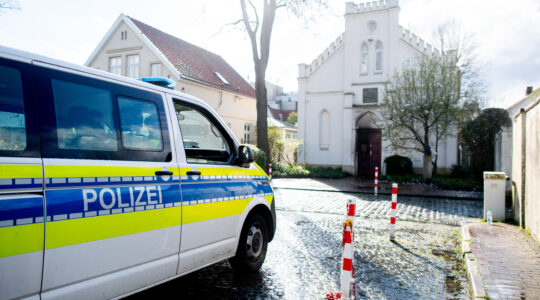BERLIN (JTA) — Two days before the U.S. election, Judith Kessler and Nadine Bose, both of whom work for this city’s Jewish community, made their own Obama T-shirts to advertise their support.
“I am not sure how all the Jews feel about Obama, but I know how I feel,” said Kessler, 49, the editor of the Berlin community’s monthly magazine, who continued wearing the shirt for several days.
Most of her colleagues shared her views, she said, “because he seems intelligent, he seems moderate, and because he presumably can really understand the position of minorities in society.”
Bose, the 28-year-old assistant to the president of the Jewish community of Berlin, said she stayed up all night with her friends to see Obama win.
“There was no conflict with our support for Obama and our support for Israel,” she said.
Another young Berlin Jew, Yael Goldberg, was rooting for McCain.
“Obviously I am a little bit biased,” said Goldberg, 27, who worked as the office manager at the Florida office of the Republican Jewish Coalition in 2005-06.
“I think what matters most is the U.S. and its impact on Israel, and this is what should interest a Jew in Germany about the American elections,” said Goldberg, who is studying Jewish studies and religion at Potsdam University.
Like their counterparts in America, who overwhelmingly embraced Obama as the right pick for president, many Jews across the world rejoiced at the outcome of the U.S. election. But much of the international Jewish community, including the institutional world, was more subdued in its reaction.
“I was for McCain because Obama is an unknown factor to me,” said Leonid Landa, a Jewish community worker and writer in St. Petersburg. “I don’t know how he will act with Israel. I don’t know if he can play in the same arena” as Russian President Dmitry Medvedev.
Just hours after Obama stepped off the stage in Chicago’s Grant Park, Medvedev gave him his first prod from the international peanut gallery, demanding in a state-of-the-nation speech that the next U.S. president abandon President Bush’s plan to set up missile systems in the Czech Republic and Poland.
Without naming Obama, Medvedev threatened to deploy reciprocal missile systems in the Russian exclave of Kaliningrad if Bush’s plan went forward.
Some in the international community, especially those who have locked horns with the Bush administration, see the U.S. president-elect as a soft touch. That attitude extends to some Jews across Europe and the former Soviet Union, several of whom said they were wary of Obama’s ability to play hardball with Russia or to act as a fair arbiter in the Middle East peace process.
Outside Russia, Jews are looking for someone who can stand up to the newly aggressive regional power. Since Russia’s invasion of Georgia in August, former Soviet countries have looked to the West for assurance and support, and some see Obama’s multilateralism as code for soft-on-Russia.
In Ukraine, that means supporting Ukraine’s bid for membership in NATO, said Josef Zissels, the head of the Association of Jewish Organizations and Communities of Ukraine.
“I think he will be more involved with the domestic politics of the United States than with foreign affairs than McCain would have been,” Zissels said, referring to Obama’s Republican opponent, U.S. Sen. John McCain. “I don’t think he has the stance on Russia that will allow Ukraine to join NATO.”
“I also don’t know how he will work with Israel,” Zissels said. “It seems to me that he may be open to radical elements in the peace talks.”
Even among those who supported the idea of an Obama presidency, some said they know little about how the president-elect would perform on the international stage.
Six months ago, Mark Lipitsky was skeptical about Obama’s chances to get elected. He remembers when Soviet leaders cited American racism as a rhetorical device to counterbalance criticism of Soviet oppression.
“The first African American elected, I am thinking it’s good for America, but the jury is still out,” said Lipitsky, a professor of North American and world history in Moscow.
Despite the wariness in some former Soviet republics, at least some in Russia had a different take.
Russian Jewry’s main Jewish Web portal dedicated its top story last week to a photo of Obama in a yarmulke with an article titled “The Most Pro-Jewish President.” The site is funded by the Chabad-run Federation of Jewish Communities, which is close to former Russian president Vladimir Putin and the Kremlin.
In the Czech Republic and Poland, there were mixed views of Obama. Anti-Bush sentiment was a key factor behind support for Obama among ordinary Jews in the former Eastern bloc, despite empathy for U.S. policies and U.S. culture in the region.
Kasia Oberet, 22, of Warsaw, said she and her friends were excited to see a member of a minority group win the U.S. presidency. She dismissed concerns expressed by some critics that a conciliatory Obama might be soft on Israel’s enemies.
”Obama might put some fresh blood into the Middle East peace talks, ” Oberet said.
In Prague, where cynicism is ingrained into the national character, Zdenek Kalvach, 26, said the Obama victory inspired him ”to see that people really are capable of change.”
Oberet and Kalvach agreed that a resurgent Russia and its anger over a proposed U.S. missile defense deployment in their countries was an issue that needed a firm hand, but they did not believe Obama would be soft in this regard.
Obama had been against missile defense as too costly and unproven, but he expressed support for the program during the presidential debates.
But his perceived soft attitude toward security issues troubles Erwin Simensohn, 29, a Romanian Jew.
”I follow the pro-Israeli agenda, and most of the Israelis I know were concerned about Obama winning,” he said. “McCain and Republican politicians give a more clear line about how they will stop Iran from developing nuclear weapons.”
In France, several Jews interviewed expressed similar concerns.
Nicole Brayda, who owns a Judaica shop in Paris, said she cried with joy when Obama won the election, but could not say the same for most of the French Jewish community, which she said was uncertain about Israel’s security under an Obama presidency.
Guershon Nduwa, the leader of a black Jewish community of some 250 in Paris, said he was “not very enthusiastic about this election.”
“As a black person, I’m happy he won,” said Nduwa, “but that’s not enough. As a Jew I need to feel sure about Israel. Those who idealize him might be disappointed because they put a lot of hope into one person, and we have to see what he’ll do concretely. He’s not the messiah.”
Such misgivings stand in sharp contrast to the vast majority of European opinion, a contrast not lost on Nduwa.
“That difference of opinion puts us in a sensitive opposition,” Nduwa said.
Richard Prasquier, the head of the French Jewish umbrella group CRIF, said that “French Jews are very attached to Israel, and globally the community has turned to the political right over the years because they felt the left couldn’t handle the new anti-Semitism that sprung during the second intifada,” or Palestinian uprising.
Prasquier said some of the uncertainty about Obama stemmed from his initially perceived position about Iran.
“He gave the impression during the first part of the campaign that discussion with Iran was an end in itself,” Prasquier said. “But he has since corrected that. He’s clearly a pragmatic person who learns easily. I have hope.”
The European Jewish Congress, also based in Paris, applauded Obama’s election but questioned whether the new president would put Israel and the Middle East on his top agenda.
“The EJC is convinced that Mr. Obama’s victory will have positive repercussions in Europe,” the group said in a statement.
Pressed by JTA about the prospects for Israel, the group said it hoped that Obama would place the Israeli-Palestinian peace process “among the key issues of his foreign policy agenda,” but it wasn’t optimistic given the financial and political situations with which he must deal.
The statement also expressed hopes for a firm American stance against a nuclear Iran, a matter the organization said was “too often left on the sidelines.”
(JTA correspondents contributing to this report were Toby Axelrod in Berlin, Devorah Lauter in Paris, Grant Slater in Odessa and Dinah Spritzer in Prague.)





